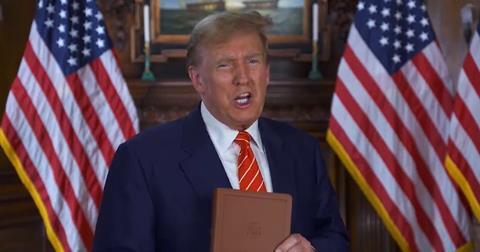Donald Trump is advertising a $60 Bible with ‘God bless the USA’ printed on the cover. The former President is wrong to use scripture as a weapon against his political enemies, says Mark Woods

Former US President Donald Trump has created a new fundraising product for his election campaign. Fair enough, we might think; but this one is a Bible.
Mr Trump tweeted:
Happy Holy Week! Let’s Make America Pray Again. As we lead into Good Friday and Easter, I encourage you to get a copy of the God Bless The USA Bible. @TheLeeGreenwood https://t.co/1KK5QgVK85 pic.twitter.com/XoCIeGDpAg
— Donald J. Trump Posts From His Truth Social (@TrumpDailyPosts) March 26, 2024
In the normal way of things, encouraging people to buy Bibles is a good thing. This one, though, has some extra features. It has the chorus from ‘God Bless The USA’ by Lee Greenwood. It has the US Constitution, the Bill of Rights, the Declaration of Independence and it has the Pledge of Allegiance.
In the video promoting his Bible, Mr Trump says, “all Americans need a Bible in their home” and that it’s his “favourite book”. He adds, “The biggest thing we have to make America great again is our religion”.
Now, let’s be honest about this. The relationship between religion and the state has varied from time to time and place to place. In our own country, the Church of England is “by law established”. The Authorized Version of the Bible is translated “by His Majesty’s special command”, and was a political as well as religious enterprise. The Bible has often been used to bolster political and social systems. Divorcing it from politics entirely isn’t possible, or perhaps even desirable. Plenty of Christians will make arguments from scripture in support of or in opposition to certain political policies. All that is well and good.
But there’s something about the God Bless the USA Bible that doesn’t feel right – and perhaps it’s because its promoter has form in this area. Back in 2020, then-President Trump stood in front of a church holding up a Bible, evidently in response to protests against the killing of George Floyd. He seemed to be claiming the Bible’s backing for him against his critics, though it wasn’t entirely plain.
In his latest venture, though, he’s much clearer. He’s identifying the Bible with a particular nation – the USA. In binding its text with his country’s foundational documents, he’s associating their spiritual authority with the authority of scripture. He’s using the Bible to further his political cause, drawing on the energies of the Christian Nationalism that sees Christianity and right-wing patriotism as two sides of the same coin. Voting for him, he implies, isn’t just the patriotic thing to do – an argument every politician is entitled to make – it’s the Christian thing, too.
Whichever side of the Atlantic we are, we should all be troubled by this – and as someone who loves the Bible and tries to live by it, I certainly am.
The Bible isn’t a weapon for us to use against our enemies. We can’t co-opt it to our own use. Its text is to be handled with reverence and fear; it is the word of God, not of the Republican Party – or of any other party. And it’s a dangerous, disturbing and uncomfortable text for anyone in power, or who seeks power; in the Bible, judgement falls very heavily on those who sin. Oddly enough, it’s the writer Stephen King, not known as a theologian, who puts this best (in Billy Summers): “The Bible has a story to puncture every equivocation and denial. The Bible – New Testament as well as Old – does not forgive.” It makes us face up to our sins and failures, and only when we’ve faced up to them do we find grace and mercy.
There’s a moment in the Old Testament before the Israelites attack Jericho that ought to give Mr Trump pause. Joshua is confronted by a man with a drawn sword in his hand.
He asks, “Are you for us or for our enemies?”
“‘Neither,’ he replied, “but as commander of the army of the Lord I have now come.” Then Joshua fell face down to the ground in reverence, and asked him, “What message does my Lord have for his servant?”’ (Joshua 5.13–14).
That ‘Neither’ is very significant. In this context, God is not on anyone’s side. He speaks to us, not for us. No one can claim him – or his word – as exclusively theirs.
The Bible has often been misused during its long history, and this is just one more example. I hope, for the sake of the Gospel, that this latest attempt is not a success.





































5 Readers' comments